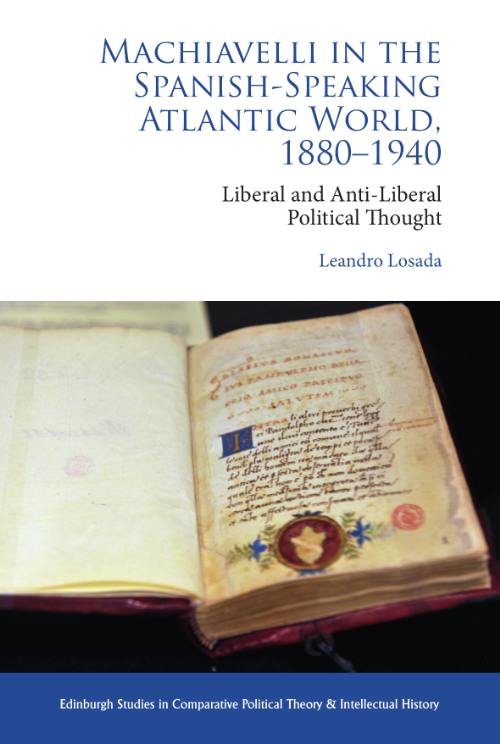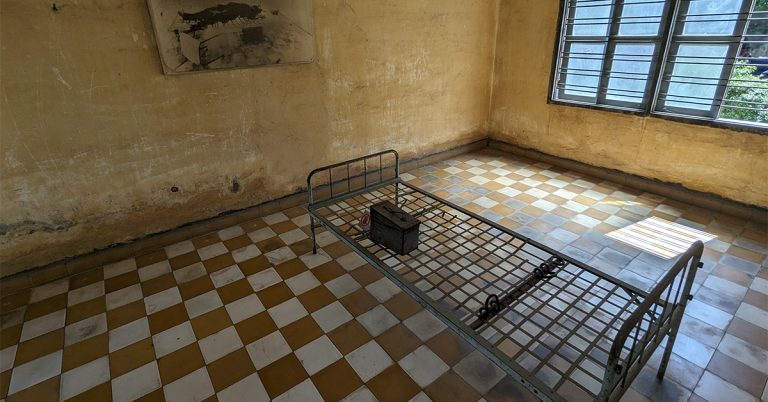
by Leandro Losada
Tell us a bit about your book.
Machiavelli in the Spanish-Speaking Atlantic World, 1880-1940 pursues two comparative approaches. One is the history of liberal and anti-liberal political thinking. The other is the reception of Machiavelli’s works in the Spanish-speaking Atlantic world and other intellectual and political milieus, especially in the English-speaking Atlantic world.
The volume reveals unknown or less-explored aspects of liberal and anti-liberal political thinking, regarding issues of political realism and its connections to personal freedom. It uncovers how people thought about, and of, the links between liberalism and republicanism, thus providing new historical evidence for contemporary debates on political theory. It also shows that some statements we once considered original to English-speaking America were also seen in the Spanish-speaking Atlantic world. One example would be the understanding of Machiavelli as a republican author who stressed the relationship between freedom and social conflict.
What inspired you to research this area? What was the most exciting thing about this project for you?
The reception of one of the foremost writers in the history of western political thought in the Spanish-speaking Atlantic world is an issue that has not been tackled in great depth, in comparison with the English-speaking Atlantic world, such as in work by John G.A. Pocock. In my opinion, to know how Machiavelli was read is a key aspect for the historical understanding of political thinking in Spain and Hispanic America. Such issues as the state, the authority, freedom or republicanism can´t be fully studied if we don´t know how Machiavelli’s lessons on these subjects were read and received. On the other hand, such research allows us to make a comprehensive and comparative approach between liberalism and anti-liberalism, as well as between English speaking and Spanish speaking political thought. That were the inspirations of my book.
Did you discover anything particularly strange or surprising?
The main interpretation available on the reception of Machiavelli in the Spanish-speaking Atlantic world came from a historiography dedicated to Spanish Baroque thought. According to this corpus, the principal reading tradition on Machiavelli was the so-called ‘anti Machiavellianism’ that favoured criticism of Machiavelli based on an interpretation of his work as inherently ‘evil’. This was due to the influence of Catholicism.
Faced with all this, the exploration of a specific period – between 1880 and 1940, whose singularity lies in the fact that it marked the apogee and crisis of liberalism – indicates that the aforementioned characterisation does not match this historical moment.
In the first place, it can be said that if the anti-Machiavellianism of Catholic origin is visible, it is equally well known that there was a similar sentiment of a liberal hue.
In the first place, it can be said that if the anti-Machiavellianism of Catholic origin is visible, it is equally well known that there was a similar sentiment of a liberal hue.
A second point is that his portrayal in negative terms (the enemy of freedom), was subject to change. Thus, over time Machiavelli simply ceased to be linked to tyranny, and came to be seen as a theoretician and of a form of the State, at odds with liberalism for its aggressive and militaristic nature, or even as a harbinger of totalitarianism.
The third point of note is that, as this period progressed, there was a major change in the conception of Machiavelli and his work. One of the more popular views espoused by his 19th century critics was that he was an ‘ancient’ author. However, at the beginning of the 20th century, the Florentine began to be perceived as a seminal author of modernity in the West. The reason for this was that a well-known aspect of his work was the separation between politics and Christian morality. It is worth noting that it was primarily Catholic intellectuals who spearheaded the portrayal of Machiavelli as modern and liberal.
A final point to emphasise is that Machiavelli’s republican facet was well known to Spanish and Latin American intellectuals and publicists. The republican reading of Florentine’s work, so important for its reception in the English-speaking Atlantic world, was also a feature in the Spanish-speaking Atlantic world. It may even be said that the controversies surrounding this point originated in issues that were less visible in the United States or England. These included the view that Machiavelli’s republicanism, instead converging with liberalism (a reading that, as has been pointed out, did exist), was instead based on anti-liberal principles.
What’s next for you?
Based on this research I am now interested in the relationship between the readings of Machiavelli and the ideological foundations of populism in the Spanish-speaking Atlantic thought of the mid-twentieth century.
About the book

Order your copy – Get 30% off with discount code NEW30
Machiavelli in the Spanish-Speaking Atlantic World, 1880-1940
by Leandro Losada
Explores the reception of Machiavelli’s works in modern Latin America and Spanish-speaking political thought between 1880 and 1940
About the author
Leandro Losada is Researcher of the State Council for Research of Argentina (CONICET) and Director of the Institute for Political Research (CONICET-UNSAM). He is also a former Wallace Fellow at the Harvard University Centre for Italian Renaissance Studies.
Sign up to our mailing list
Want to hear more about what we’re publishing? Sign up to our mailing list! You’ll be the first to hear about new books, blog posts and events.





